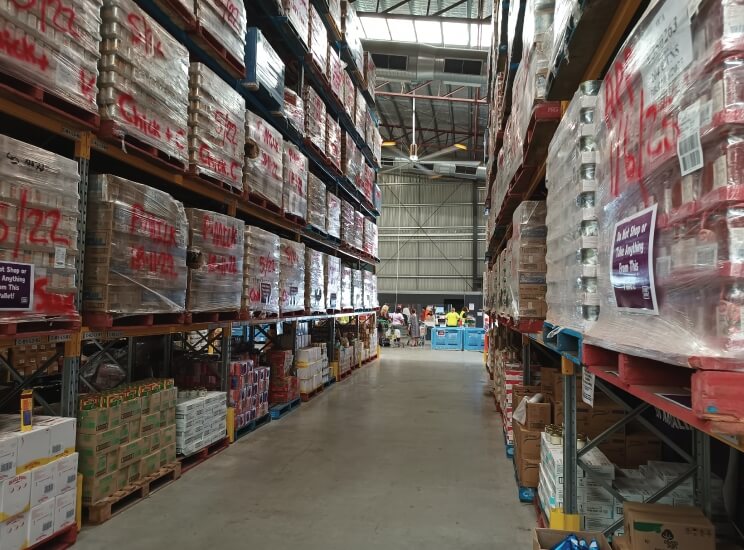When severe flood damage saw the Trans-Australian Railway line closed for nearly a month, it reduced our national deliveries from 40 pallets a week to zero. With 300 km of rail line needing repair and a mammoth backlog of goods ahead of us in the queue, the situation wasn’t going to change any time soon.
40 pallets were caught on the wrong side of the border, and with no space available to stockpile, our share of national donations were given to Foodbank Victoria to absorb.
Days dragged into weeks and empty shelves became a familiar site in major supermarkets around the state. Meanwhile, at Foodbank WA, our customers noticed very little difference.
So how did we do it?
In March of 2020, early days of the pandemic, Foodbank WA was given a frightening taste of how quickly world events can impact our operations. Demand for food assistance soared and a run on supermarkets drastically reduced donations from food and grocery industry partners. Our Perth Centre for Hunger Relief was barely recognisable, shelves normally stacked to the roof with pallets were completely bare. Turning away the most vulnerable people in our community was heartbreaking and we needed to find ways to stop it from happening again.
With over 6,000 square metres of warehouse space, we’ve always held plenty of stock, but changes to the way we manage inventory have taken our safety net to the next level. We now hold 3 months supply for the shop, plus another 3 months supply of long-life pantry essentials which can be used for making hampers. In another warehouse nearby, a rotating stockpile of 400 emergency hampers ensures we’re ready to step up in times of emergency, even if the pandemic halts operations at our Centre for Hunger Relief.
Supplies have always been unpredictable from week to week as they depended on which products suppliers donate. We’ve now increased the amount of core product we purchase to fill any gaps, so the mix of stockpiled goods closely matches the forecasted needs of our clients, even when donations do not.
We’re fortunate in the West to be largely self-sufficient in fresh produce. Foodbank WA sources fresh produce locally, so the rail disruption had little effect on our supplies of fruit and vegetables, meat and milk.
When it comes to non-core products, our shop is like a box of chocolates – you never know what you’re gonna get. Clients who shop with us regularly might have noticed less variety and less of those special not-so-vital items. We had plenty of pasta, rice and soups, but condiments like mayonnaise and peanut butter would have to be for another day.
We’re fortunate in the West to be largely self-sufficient in fresh produce. Foodbank WA sources fresh produce locally, so the rail disruption had little effect on our supplies of fruit and vegetables, meat and milk.
The biggest impact on our range was the eastern state’s products in the chilled section such as cheeses, yoghurts and dairy treats. These are not items we can stockpile so they ran out quickly, but local supplies covered the basic needs of our shoppers. One essential we did run out of – quite unexpectedly – was hamper boxes. Our iconic white and purple cartons are produced in WA by Visy, but Visy depends on rail freight for paper pulp. The 20,000 cartons we ordered in January should have seen us through to the middle of the year, but we only had enough left to last three weeks. Freight delays saw another of our partners lending a hand unexpectedly. With no deliveries to unload, staff at Coles Distribution Centre found themselves with idle hands. They volunteered their time to help pack hampers in our warehouse. COVID safe measures have seen our volunteer numbers dwindle so we were very grateful for the help.
Repairs to the section of railway between Adelaide and Tarcoola took 24 days to complete. On February 15, rail freight resumed at last, with trains up to 2 kilometres long, hauling up to 300 containers. Customers who rushed to supermarkets expecting products to magically reappear on shelves have been sorely disappointed. Even with extra trucks bringing freight by road, it’s expected to take weeks to clear the backlog, and since Foodbank WA’s freight space is donated, we’re at the back of the queue. We’ll be ok though, we’ve planned for this.
Guaranteeing the food supply of Western Australians through crises, whether on an individual or global scale isn’t negotiable, but disaster-proofing our operation is not without financial cost. The items that fill the gaps in donated supply need to be purchased, managed and stored. We rely on the continued financial support of the community and corporate partners because securing our food supply through adversity is just as much about money in the bank as it is about food in the bank. We’ve seen some tough times recently, but the coming months could bring another test of our reserves.
How you can help?
Sadly there is a gap between the amount of food that we rescue and source and what is needed to feed tens of thousands of West Australians every month. Increasingly the general public contributes to our food supply by donating food directly to their local Foodbank branch or by coordinating a Food Drive.
Donate funds, every $1 will help provide 2 meals.
 Contact us
Contact us Log in
Log in
